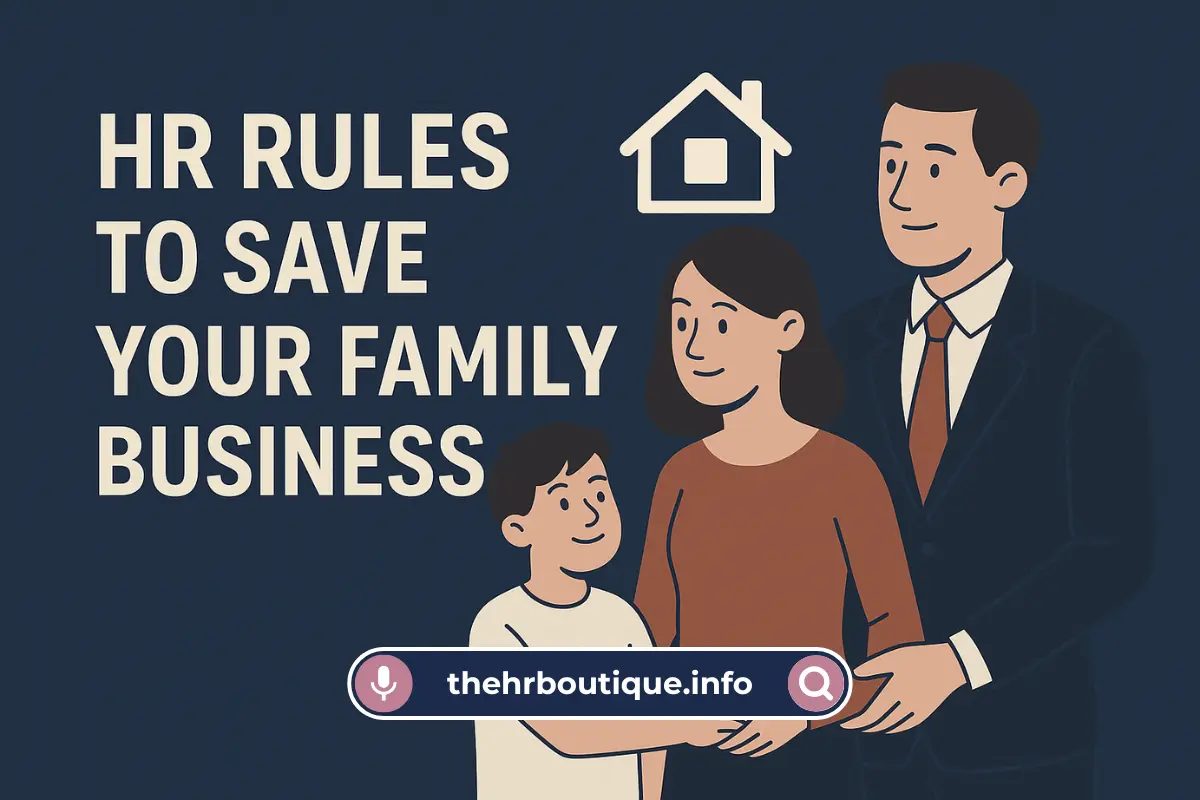Let me tell you about the Johnson family. They ran a successful hardware store for three generations until last year, when two brothers stopped speaking over a disagreement about their niece’s promotion. Their annual Thanksgiving dinner? Cancelled. The business? Sold to a competitor.
This didn’t have to happen.
After 12 years helping family businesses navigate these minefields, I’ve learned that the difference between thriving multi-generational companies and dramatic business divorces often comes down to one thing: how they handle HR.
The Family Promotion Trap (And How to Avoid It)
Last month, I sat across from a frustrated non-family employee who told me: “I’ve trained three of the owner’s kids for management roles. Each one became my boss within six months. I’m done.”
This is why you can’t just promote family members because they’re family. Here’s what works better:
- The Intern Rule: Every family member starts at the same entry-level position as everyone else. No exceptions. I recently worked with a construction company where the CEO’s daughter spent her first summer cleaning job sites. She’s now one of their most respected managers.
- The 18-Month Test: Before any family member gets promoted, they need to either:
- Hit specific performance targets for a year and a half
- Get certified in their field (like a real estate license if you’re a brokerage)
- Earn the endorsement of three non-family managers
- The Title Freeze: No VP positions before age 30. I don’t care if they’re the smartest 25-year-old you know. Wait until they’ve earned some scars.
The Salary Conversation No One Wants to Have
The awkward truth? Most family businesses pay relatives more than their non-family employees. And everyone knows it.
Here’s how to fix it without causing a revolt:
- Create pay brackets for every position and stick to them. If you must pay a family member more because they’re an owner, call it what it is – profit distribution, not salary.
- Publish your compensation philosophy. Example: “We pay at the 60th percentile for our industry and region. All raises are based on these three measurable factors…”
- Have one non-family employee review salaries annually. Their only job? Flag any obvious favoritism.
Succession Planning That Doesn’t Ruin Thanksgiving
The average family business spends more time planning their summer vacation than their leadership transition. Here’s the bare minimum you should do:
- The 5-Year Rule: Start talking succession at least five years before the current leader plans to step down. Yes, it’s uncomfortable. So is watching your life’s work disintegrate because no one was prepared.
- The Backup Plan: Identify and groom at least two potential successors. Because life happens – people get sick, move away, or change careers.
- The Trial Run: Give potential successors actual authority (not just responsibility) for at least two years before the transition. I’ve seen too many “heir apparents” crumble under real pressure.
The Non-Family Employee Dilemma
Your best non-family employees will leave if they hit an invisible ceiling. Here’s how to keep them:
- Create a “Family-Free” Promotion Path: Certain leadership roles should be open based purely on merit. Make this explicit.
- Give Them Real Influence: When making big decisions, ask three non-family employees for input first. Then actually use it.
- Protect Them From Family Drama: They shouldn’t have to navigate your uncle’s mood swings or mediate between cousins.
When to Call For Backup?
Even the healthiest families need outside help sometimes. Bring in a consultant when:
- Compensation discussions get emotional (which they always do)
- You’re about to make a family member a manager
- More than one key employee quits in six months
- You’re losing sleep over a people problem
The Bottom Line
Family businesses have advantages that corporations can only dream of – loyalty, shared history, and the ability to make quick decisions. But these strengths become weaknesses without clear HR guardrails.
The good news? Implementing just one or two of these strategies can dramatically reduce your family drama while making your business stronger. Start small, but start today.
Because I promise you, no one ever regrets being proactive about this stuff. But plenty of families regret waiting until it was too late.





